
Resources
Browse our full library of in-depth resources and publications
The PacWastePlus programme team is committed to producing meaningful and valuable publications and resources that provides guidance for improving waste management in the Pacific
Search
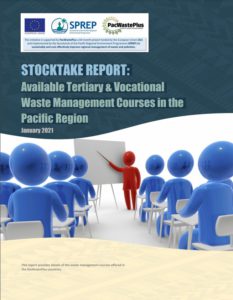
Technical Report
Stocktake Report: Available Tertiary & Vocational Waste Management Courses in the Pacific Region
This report provides details of the waste management courses offered in the PacWastePlus participating countries. The Institute of Applied Sciences of The University of the South Pacific was engaged to carry out a stocktake assessment of tertiary and vocational waste management education and training to identify any existing or potential accredited waste management training, competency-based assessments, or hands-on training opportunities currently available to participating countries.
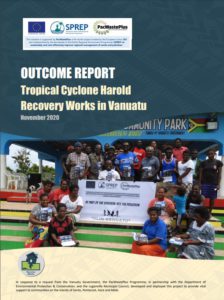
Technical Report
Outcome Report: Tropical Cyclone Harold Recovery Works in Vanuatu
Following a request from the Vanuatu Government to provide support for waste clean-ups following Tropical Cyclone Harold which made landfall in Vanuatu in April 2020, the PacWastePlus Programme, in consultation with the Department of Environmental Protection and Conservation (DEPC), and other donor-funded waste projects, implemented support activities to nine communities on the islands of Santo, Pentecost, Aore and Malo. The project was deployed in September 2020 following extensive consultation to confirm the specific support requirements. The project was managed by staff from PacWastePlus (Regional Officer based in Vanuatu), an extension officer for DEPC, and support from the Luganville Municipal Council (LMC).
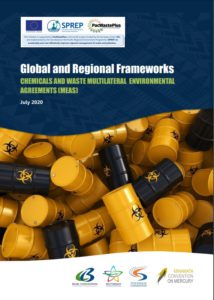
Booklet
Global and Regional framework – Chemicals and waste multilateral environmental agreements (MEAs)
Multilateral Environmental Agreements (MEAs) are legally binding agreements between States or International Organisations that have responsibilities for managing elements of the natural environment. The Chemicals and Waste focused MEAs address procedures and actions related to the transboundary movements of materials such as hazardous waste, radioactive waste, and persistent organic pollutants. MEAs provide strong foundations to support and guide Pacific islands in the management of impacts from waste, controlling the transboundary movement of waste, and supports countries to implement the SDGs and secure a healthier environment for their people.
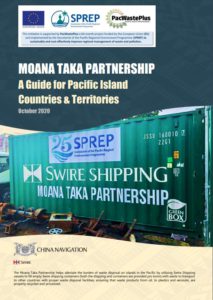
Booklet
Moana Taka Partnership-A Guide for Pacific Island Countries & Territories
Pacific Island Countries and Territories (PICTs) have amassed a huge amount of waste, much of it hazardous, including large number of plastics. These are wastes are washed into the surrounding seas when tropical cyclones and floods occur. Marine litter continually enters the region on ocean currents from stormwater, fishing vessels, cruise ships and container ships. The Moana Taka Partnership helps alleviate the burden of waste on islands in the Pacific by enabling Swire Shipping vessels to utilise empty shipping containers to transport non-commercial recyclable waste from islands. This waste is transported to countries with appropriate waste disposal facilities, ensuring that everything from oil to plastics to aerosols are properly recycled.
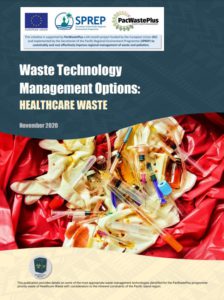
Waste Technology Management Options
Waste Technology Management Options: Healthcare Waste
The Waste Technology Management Options: Healthcare waste publication provides details on some of the most appropriate waste management technologies identified for the PacWastePlus programme priority waste of Healthcare Waste with consideration to the inherent constraints of the Pacific island region.
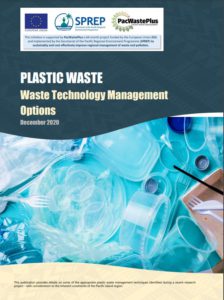
Waste Technology Management Options
Waste Technology Management Options: Plastic Material
The Waste Technology Management Options: Plastic Material publication provides details on some of the appropriate plastic waste management techniques identified during a research project - with consideration to the inherent constraints of the Pacific island region.

Waste Technology Management Options
Waste Technology Management Options: Organic Material
The Waste Technology Management Options: Organic Material publication provides details on some of the most appropriate waste management technologies identified for Organic Materials - with consideration to the inherent constraints of the Pacific island region.
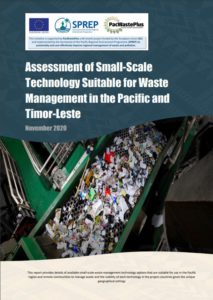
Waste Technology Management Options
Assessment of Small-Scale Technology Suitable for Waste Management in the Pacific and Timor-Leste
This report summarises the most appropriate waste management technologies with consideration to the inherent constraints of the Pacific island region. The waste streams investigated are Hazardous Waste: Health care waste, E-waste, Asbestos, Solid waste: Recyclables, Organic waste, Disaster waste, Bulky waste, Wastewater: Water impacted by Solid Waste. It outlines the context, the methodology adopted, presents the key findings and recommendations. This research focused on investigating the range of technology options and providers for the priority waste streams. The technologies identified were deemed capable of assisting with the management of one or more of the priority waste streams.
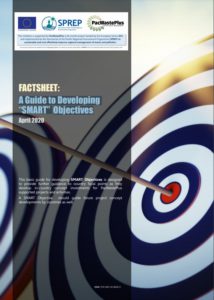
Project Management Tools
A Guide to Developing “SMART” Objectives
This basic guide for developing Specific, Measurable, Achievable, Realistic and Timely (SMART) Objectives is designed to provide further guidance to country focal points as they develop in-country concept investments for PacWastePlus supported projects and activities.
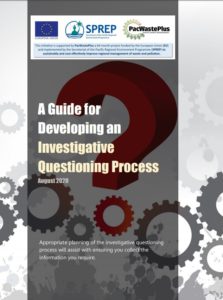
Project Management Tools
A Guide for Developing an Investigative Questioning Process
The process of investigative questioning, or inquiry, assists project managers to ask questions of individuals or groups, who know something, or a lot, about a particular area of interest to the interviewer. It is also about finding out information or needs on a subject which can be used to benefit those stakeholders/individuals e.g. through a project planning process. This publication provides initial guidance on the various investigative questioning processes that can be utilised.
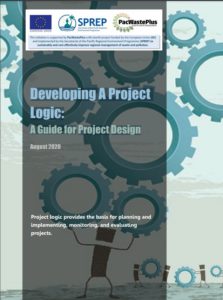
Project Management Tools
Developing A Project Logic: A Guide for Project Design
For PacWastePlus it is expected that all teams designing activities will have developed some form of project logic in participation with their implementing partners. This will demonstrate the logic of your collaborative thinking and design, and clearly articulate the changes to which you hope to contribute. Project logic provides the basis for planning and implementing monitoring and evaluation at the project level.
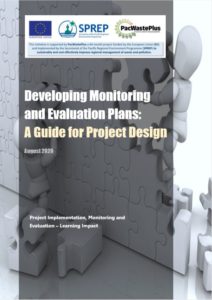
Project Management Tools
Developing Monitoring and Evaluation Plan: A Guide for Project Designs
Building a Monitoring and Evaluation (M&E) plan for a project assists to deliver the intended outcome, and if not, it should help you understand which elements should be modified to assist with delivering a successful project. This publication provides guidance on how to develop an M&E plan for not only PacWastePlus country projects but can also be used as a resource tool during the development of other donor-funded country projects as well.
Newsletter Subscription
Would you like to subscribe to our quarterly programme newsletter-The Connection?
We care about the protection of your data. Read our Privacy Policy.
Newsletter Signup
To sign up to our newsletter, enter the information below and we will add you to our mailing list for all future regional and project updates.
